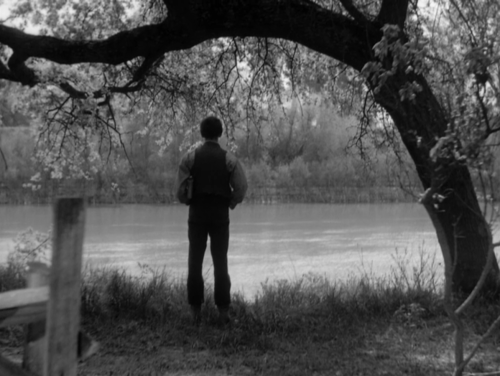Young Mr. Lincoln (1939)
John Ford’s ‘Young Mr. Lincoln’ (1939)
Thematic Elements: Mr. Lincoln seems to be a sneaky
western genre. On the surface, it doesn’t look like a typical western. However,
it displays the thematic elements of the western, a man comes into an
environment of chaos and lawlessness and asserts his will to control the chaos
and bring law and order. Lincoln comes from a simple life and decides to study
law. After studying and practicing law, he comes across a murder in which the
townspeople have already decided to circumvent law and order and act as judge,
jury, and executioners. Lincoln uses empathy and reason with a beaming lightness
to calm the chaos and bring actual lawful proceedings underway. Ford sees
Lincoln as representing the necessary steps of society and reasoning to control
the chaos of the west.
Camerawork: The way Ford portrays Lincoln shows him
as being very much of the society he is from, rather than an alien to the
environment. Ford seems to suggest that this logic, lawfulness, and reason can
come from these rural areas in which society is more prone to unlawful
circumvention. Ford does this by photographing Lincoln in areas of resolute
nature. This suggests that this behavior and reasoning can be natural, rather
than coming from some higher power. Lincoln uses this natural reasoning to bend
and shape society to form his ideals of a civilized and lawful state.
Best Shot: The best shot of the movie shows Lincoln
standing in nature looking at the ripples from the rock he had thrown into the
river. This both illustrates the previous point above about Lincoln coming form
an organic state of mind and nature, as well as illustrating how that mindset
and belief can change the world around him. The ripples from the rock represent
the impact that Lincoln has on the society around him. And because we know how
the Lincoln story unfolds, it resonates clearly. Lincoln was a man who came to
resolute conclusions about belief of reasoning and empathy who would go on to
shape and bend the world around him to fit these positive narratives.




Comments
Post a Comment